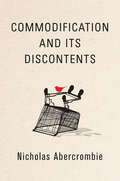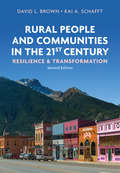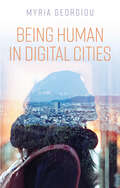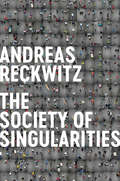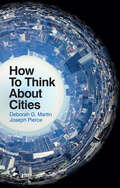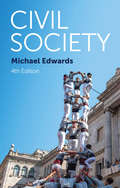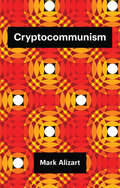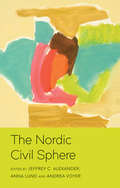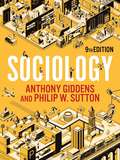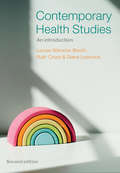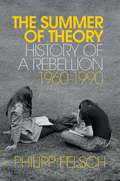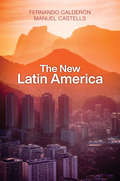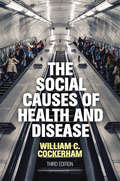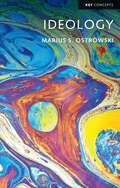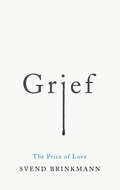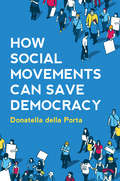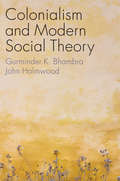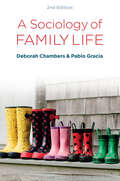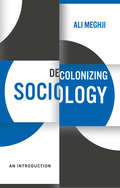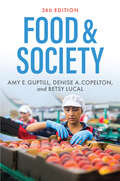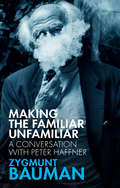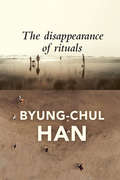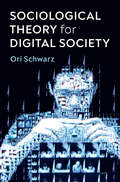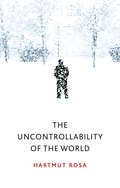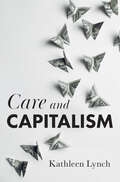- Table View
- List View
Commodification and Its Discontents
by Nicholas AbercrombieShould human organs be bought and sold? Is it right that richer people should be able to pay poorer people to wait in a queue for them? Should objects in museums ever be sold? The assumption underlying such questions is that there are things that should not be bought and sold because it would give them a financial value that would replace some other, and dearly held, human value. Those who ask questions of this kind often fear that the replacement of human by money values – a process of commodification – is sweeping all before it. However, as Nicholas Abercrombie argues, commodification can be, and has been, resisted by the development of a moral climate that defines certain things as outside a market. That resistance, however, is never complete because the two regimes of value – human and money – are both necessary for the sustainability of society. His analysis of these processes offers a thought-provoking read that will appeal to students and scholars interested in market capitalism and culture.
Rural People and Communities in the 21st Century: Resilience And Transformation
by David L. Brown Kai A. SchafftRural people and communities continue to play important social, economic and environmental roles at a time in which societies are rapidly urbanizing, and the identities of local places are increasingly subsumed by flows of people, information and economic activity across global spaces. <P><P>However, while the organization of rural life has been fundamentally transformed by institutional and social changes that have occurred since the mid-twentieth century, rural people and communities have proved resilient in the face of these transformations. <P><P>This book examines the causes and consequences of major social and economic changes affecting rural communities and populations during the first decades of the twenty-first century, and explores policies developed to ameliorate problems or enhance opportunities. Primarily focused on the U.S. context, while also providing international comparative discussion, the book is organized into five sections each of which explores both socio-demographic and political economic aspects of rural transformation. It features an accessible and up-to-date blend of theory and empirical analysis, with each chapter's discussion grounded in real-life situations through the use of empirical case-study materials. <P><P> Rural People and Communities in the 21st Century is intended for advanced undergraduate and graduate courses in rural sociology, community sociology, rural and/or population geography, community development, and population studies.
Being Human in Digital Cities
by Myria GeorgiouHow is life in digital cities changing what it means to be human?In this perceptive book, Myria Georgiou sets out to investigate the new configuration of social order that is taking shape in today’s cities. Although routed through extractive datafication, compulsive connectivity, and regulatory AI technologies, this digital order nonetheless displaces technocentrism and instead promotes new visions of humanism, all in the name of freedom, diversity, and sustainability. But the digital order emerges in the midst of neoliberal instability and crises, resulting in a plurality of contrasting responses to securing digitally mediated human progress. While corporate, media, and state actors mobilize such positive sociotechnical imaginaries to promise digitally mediated human progress, urban citizens and social movements propose alternative pathways to autonomy and dignity through and sometimes against digital technologies. Investigating the dynamic workings of technology and power from a transnational and comparative perspective, this book reveals the contradictory claims and struggles for the future of digital cities and their humanity. In doing so, it will enrich understandings of digital urbanism, critical data studies, and critical humanist studies.
Society of Singularities
by Andreas ReckwitzOur contemporary societies place more and more emphasis on the singular and the unique. The industrial societies of the early 20th century produced standardized products, cities, subjects and organizations which tended to look the same, but in our late-modern societies, we value the exceptional - unique objects, experiences, places, individuals, events and communities which are beyond the ordinary and which claim a certain authenticity. Industrial society’s logic of the general has been replaced by late modernity’s logic of the particular. In this major new book, Andreas Reckwitz examines the causes, structures and consequences of the society of singularities in which we now live. The transformation from industrial to cultural capitalism, the rise of digital technologies and their ‘culture machine’ and the emergence of an educated, urban new middle class form a powerful engine for the singularization of the social. In late modernity, what is singular is valorized and stirs the emotions, while what is general has to remain in the background, and this has profound social consequences. The society of singularities systematically produces devaluation and inequality: winner-takes-all markets, job polarization, the neglect of rural regions and the alienation of the traditional middle class. The emergence of populism and the rise of aggressive forms of nationalism which emphasize the cultural authenticity of one’s own people thus turn out to be the other side of singularization. This prize-winning book offers a new perspective on how modern societies have changed in recent decades and it will be of great value to anyone interested in the forces that are shaping our world today.
How To Think About Cities
by Deborah G. Martin Joseph PierceCities are raucous, cacophonous, and complex. Many dimensions of life play out and conflict across cities’ intricate landscapes, be they political, cultural, economic, or social. Urban policy makers and analysts often attempt to “cut through the noise” of urban disagreement by emphasizing a dominant lens for understanding the key, central logic of the city. How To Think About Cities sees this tendency to selective vision as misleading and ultimately unjust: cities are many things at once to different people and communities. This book describes the various ways of seeing the functions and landscapes of the city as place frames, and the constant process of negotiating which place frames best explain the city as place-making. Martin and Pierce call for an explicitly hybrid perspective that shifts between many different frames for making sense of cities. This approach highlights how any given stance opens up some lines of inquiry and understanding while closing off others. Thinking of cities as sites of contested perspectives promotes a synthetic approach to urban analysis that emphasizes difference and political possibility. This mosaic view of the city will be a welcome read for those within urban studies, geography, and social sciences exploring the many faces of urban life.
Civil Society: Civil Society And The Social Capital Debate In Comparative Perspective (Oxford Handbooks Ser.)
by Michael EdwardsNow in its fourth edition, Civil Society has become a major work of reference for those who seek to understand the role of voluntary citizen action in a troubled world. Recent economic and political developments do not bode well for the theory and practice of civil society: communities are increasingly divided; inequality is on the rise; authoritarians and populists have gained a foothold even in advanced democracies; restrictions on freedom of speech and association are increasingly common and recent scandals have even reduced trust in charities. Worryingly, public spheres seem incapable of addressing these concerns. Yet, as Michael Edwards makes clear, ideas about the civil sphere can shed much light on what is happening, why, and how we might respond to polarization, privatization, and authoritarians of various stripes. Fully updated to take account of recent work on digital culture, democracy, and philanthropy, Civil Society will be required reading for anyone who is interested in creating a better world through voluntary citizen action.
Cryptocommunism (Theory Redux)
by Mark AlizartCryptocurrencies are often associated with right-wing political movements, or even with the alt-right. They are the preserve of libertarians and fans of Ayn Rand and Friedrich Hayek. With their promotion of anonymity and individualism, there’s no doubt that they seamlessly slot into the prevailing anti-State ideology. But in this book Mark Alizart argues that the significance of cryptocurrencies goes well beyond cryptoanarchism. In so far as they allow us ‘to appropriate collectively the means of monetary production’, to paraphrase Marx, and to replace ‘the government of persons by the administration of things’, as Engels advocated, they form the basis for a political regime that begins to look like a communism which has at last come to fruition – a cryptocommunism.
The Nordic Civil Sphere
by Jeffrey C. Alexander Anna Lund Andrea VoyerThe civil sphere is a distinctively democratic field in modern societies, one that sustains universalizing cultural aspirations and organizational structures and that has tense and uncertain boundaries with other spheres of social life, like the economy, religion, family, and state. Unlike the latter, which are more particularistic and hierarchical in character, the civil sphere defines itself in terms of solidarity – the feeling of being connected with every other person in the collectivity. The utopian ideals of democratic solidarity shape every modern society, even if they are often compromised by the messy realities of social life. This volume uses the theory of the civil sphere to shed new light on Nordic societies, while at the same time drawing on the distinctive experiences of the Nordic nations to reflect on and advance the theory of the civil sphere. Nordic societies have long been admired for creating a distinctive form of social democracy, but this admirable achievement has not been well conceptualized theoretically. Most attempts to explain Nordic social democracy focus on material and organizational factors. This volume, by contrast, emphasizes the cultural foundations and characteristics of social democracy, demonstrating how civil sensibilities are necessary for the creation of an egalitarian and democratic state. Nordic civil spheres, however, are not only pro-civil but also white in color, European in ethnicity, secular in character and gender-equal in a subtly restrictive manner. Such primordialization of state civility is vividly on display in the sometime tense relationships that develop among natives and “foreigners” in Nordic countries, relationships that expose the primordial undersides of the social democratic codes and civil values that constitute the Nordic civil sphere. A major contribution to the theory of the civil sphere and to our understanding of the cultural and normative underpinnings of social and political life, this volume will be of particular interest to students and scholars of sociology and politics.
Sociology: Introductory Readings
by Anthony Giddens Philip W. SuttonThe indispensable guide to understanding the world we make and the lives we lead. This thoroughly revised and updated ninth edition remains unrivalled in its vibrant, engaging and authoritative introduction to sociology. The authors provide a commanding overview of the latest global developments and new ideas in this fascinating subject. Classic debates are also given careful coverage, with even the most complex ideas explained in a straightforward way. Written in a fluent, easy-to-follow style, the book manages to be intellectually rigorous but still very accessible. With a strong focus on interactive pedagogy, it aims to engage and excite readers, helping them to see the enduring value of thinking sociologically. The ninth edition includes: a solid foundation in the basics of sociology: its purpose, methodology and theories; up-to-the-minute overviews of key topics in social life, from gender, personal life and poverty, to globalization, the media and politics; stimulating examples of what sociology has to say about key issues in our contemporary world, such as climate change, growing inequality and rising polarization in societies across the world; a strong focus on global connections and the ways that digital technologies are radically transforming our lives; quality pedagogical features, such as ‘Classic Studies’ and ‘Global Society’ boxes, and ‘Thinking Critically’ reflection points, as well as end-of-chapter activities inviting readers to engage with popular culture and original research articles to gather sociological insights. The ninth edition sets the standard for introductory sociology in a complex world. It is the ideal teaching text for first-year university and college courses, and will help to inspire a new generation of sociologists.
Contemporary Health Studies: An Introduction
by Louise Warwick-Booth Ruth Cross Diane LowcockContemporary Health Studies provides an accessible introduction to current issues and key debates in understanding and promoting health. Its up-to-date, global focus places a strong emphasis on the social, political and environmental dimensions of health. Part One sets the scene by looking closely at the definition of ‘health’ and outlining the aims and purpose of health studies. Part Two explores the different disciplines that underpin health studies, such as sociology, psychology, anthropology and health psychology, incorporating new theoretical frameworks to help readers understand health. Part Three applies this knowledge to address the determinants of health, including chapters on individual factors, the role of public health, the latest policy influences on health and the growing importance of the global context. Each chapter contains contemporary statistics and evidence alongside carefully developed learning features designed to highlight the fundamentals of each topic, to apply these to in-depth case studies – from global antibiotic resistance to the challenge and promise of digital data –, and to pose questions for reflection and debate. Contemporary Health Studies is an essential guide for undergraduate health students written by three authors who have a wealth of teaching experience in this subject area. Their book will inspire readers to consider the human experience of health within contemporary global society as it is mediated by individual, societal and global contexts.
The Summer of Theory: History of a Rebellion, 1960-1990
by Philipp Felsch‘Theory’ – a magical glow has emanated from this word since the sixties. Theory was more than just a succession of ideas: it was an article of faith, a claim to truth, a lifestyle. It spread among its adherents in cheap paperbacks and triggered heated debates in seminar rooms and cafés. The Frankfurt School, Structuralism, Post-Structuralism, Adorno, Derrida, Foucault: these and others were the exotic schools and thinkers whose ideas were being devoured by young minds. But where did the fascination for dangerous thoughts come from? In his magnificently written book, Philipp Felsch follows the hopes and dreams of a generation that entered the jungle of difficult texts. His setting is West Germany in the decades from the 1960s to the 1990s: in a world frozen in the Cold War, movement only came from big ideas. It was the time of apocalyptic master thinkers, upsetting reading experiences and glamorous incomprehensibility. As the German publisher Suhrkamp published Adorno’s Minima Moralia and other High Theory works of the Frankfurt School, a small publisher in West Berlin, Merve Verlag, provided readers with a steady stream of the subversive new theory coming out of France. By following the adventures of the publishers who provided the books and the reading communities that consumed and debated them, Philipp Felsch tells the remarkable story of an intellectual revolt when the German Left fell in love with Theory.
The New Latin America
by Fernando Calderon Manuel CastellsLatin America has experienced a profound transformation in the first two decades of the 21st century: it has been fully incorporated into the global economy, while excluding regions and populations devalued by the logic of capitalism. Technological modernization has gone hand-in-hand with the reshaping of old identities and the emergence of new ones. The transformation of Latin America has been shaped by social movements and political conflicts. The neoliberal model that dominated the first stage of the transformation induced widespread inequality and poverty, and triggered social explosions that led to its own collapse. A new model, neo-developmentalism, emerged from these crises as national populist movements were elected to government in several countries. The more the state intervened in the economy, the more it became vulnerable to corruption, until the rampant criminal economy came to penetrate state institutions. Upper middle classes defending their privileges and citizens indignant because of corruption of the political elites revolted against the new regimes, undermining the model of neo-developmentalism. In the midst of political disaffection and public despair, new social movements, women, youth, indigenous people, workers, peasants, opened up avenues of hope against the background of darkness invading the continent. This book, written by two leading scholars of Latin America, provides a comprehensive and up-do-date account of the new Latin America that is in the process of taking shape today. It will be an indispensable text for students and scholars in Latin American Studies, sociology, politics and media and communication studies, and anyone interested in Latin America today.
The Social Causes of Health and Disease
by William C. CockerhamThis stimulating book has become a go-to text for understanding the role that social factors play in the experience of health and many diseases. This extensively revised and updated third edition offers the most compelling case yet that stress, poverty, unhealthy lifestyles, and unpleasant living and working conditions can all be directly associated with illness. The book continues to build on the paradigm shift that has been emerging in twenty-first-century medical sociology, which looks beyond individual explanations for health and disease. As the field has headed toward a fundamentally different orientation, William Cockerham’s work has been at the forefront of these changes, and he here marshals evidence and theory for those seeking a clear and authoritative guide to the realities of the social determinants of health. Of particular note in the latest edition is new material on the relationship between gender and health, implications of the life course for health behavior, the health effects of social capital, and the emergence of COVID-19. This engaging introduction to social epidemiology will be indispensable reading for all students and scholars of medical sociology, especially those with the courage to confront the possibility that society really does make people sick.
Ideology (Key Concepts)
by Marius S. OstrowskiOver its long history, the concept of ideology has acquired a vast and at times incommensurable roster of meanings: positive and negative, analytic and critical, philosophical, psychological and scientific. But how precisely should we understand and study ideology today? What is its connection to key issues in social life and social research, such as capitalism and class, democracy and partisanship, nationality, sex and gender, race and ethnicity? In this book, Marius S. Ostrowski navigates a path through the complex maze of ideology’s rival interpretations, tracing the shifting fortunes of ideology analysis from its classical origins to its recent renaissance. The result is a concise interdisciplinary overview of how ideologies combine and arrange ideas and how they manifest in our psychology and behaviour. Drawing on a wide array of examples from across the world, the book outlines the historical preconditions that allowed modern ideologies to emerge and illuminates how we experience ideology’s influence in our day-to-day lives. Ideology will be an indispensable resource for students and scholars across the social sciences and anyone seeking to understand the way ideology shapes how we understand the world around us.
Grief: The Price of Love
by Svend BrinkmannWherever love and death meet there is grief. It affects us all regardless of ethnicity, age, class, or sexual orientation. Grief is universal – it has endured across time, societies and cultures from the earliest human communities to the present day. But the way we deal with grief is changing. Increasingly, we are diagnosing grief as a medical condition to be treated rather than embracing it as a natural part of being human. In this book, Svend Brinkmann gets to the heart of what it is to grieve, arguing that the sorrow we experience after the death of a loved one is a necessary and meaningful dimension of human existence. However painful, it unites us all. As humans we are uniquely privileged to feel grief. Rather than trying to escape or smother grief, we must allow ourselves to feel and accept it as the price we pay for love.
How Social Movements Can Save Democracy: Democratic Innovations from Below
by Donatella della PortaThe birth of democracies owes much to the interventions and mobilizations of ordinary people. Yet many feel as though they have inherited democratic institutions which do not deliver for the people – that a rigid democratic process has been imposed from above, with increasing numbers of people feeling left out or left behind. In this well-researched volume, leading political sociologist Donatella della Porta rehabilitates the role social movements have long played in fostering and deepening democracy, particularly focusing on progressive movements of the Left which have sought to broaden the plurality of voices and knowledge in democratic debate. Bridging social movement studies and democratic theory, della Porta investigates contemporary innovations in times of crisis, particularly those in the direction of participatory and deliberative practices – ‘crowd-sourced constitutions’, referendums from below and movement parties – and reflects on the potential and limits of such alternative politics. In a moment in which concerns increase for the potential disruption of a Great Regression led by xenophobic movements and parties, the cases and analyses of resistance in this volume offer important material for students and scholars of political sociology, political science and social movement studies.
Colonialism and Modern Social Theory
by John Holmwood Gurminder K. BhambraModern society emerged in the context of European colonialism and empire. So, too, did a distinctively modern social theory, laying the basis for most social theorising ever since. Yet colonialism and empire are absent from the conceptual understandings of modern society, which are organised instead around ideas of nation state and capitalist economy. Gurminder K. Bhambra and John Holmwood address this absence by examining the role of colonialism in the development of modern society and the legacies it has bequeathed. Beginning with a consideration of the role of colonialism and empire in the formation of social theory from Hobbes to Hegel, the authors go on to focus on the work of Tocqueville, Marx, Weber, Durkheim and Du Bois. As well as unpicking critical omissions and misrepresentations, the chapters discuss the places where colonialism is acknowledged and discussed – albeit inadequately – by these founding figures; and we come to see what this fresh rereading has to offer and why it matters. This inspiring and insightful book argues for a reconstruction of social theory that should lead to a better understanding of contemporary social thought, its limitations, and its wider possibilities.
A Sociology of Family Life: Change and Diversity in Intimate Relations
by Deborah Chambers Pablo GraciaFamily relations are undergoing dramatic changes globally and locally. At the same time, certain features of family life endure. This popular book, now in a fully updated second edition, presents a comprehensive assessment of recent research on 'family', parenting, childhood and interpersonal ties. A Sociology of Family Life queries assumptions about a disintegration of 'the family' by revealing a remarkable persistence of commitment and reciprocity across cultures, within new as well as traditional family forms. Yet, while new kinds of intimate relationships such as 'friends as family' and LGBTQ+ intimacies become commonplace, such personal relationships can still be difficult to negotiate in the face of wider structural norms. With a focus on factors such as class, gender, race, ethnicity and sexuality, this new edition highlights inequalities that influence and curb families and personal life transnationally. Alongside substantial new material on cultural and digital transformations, the book features extensive updates on issues ranging from demography, migration, ageing and government policies to reproductive technologies, employment and care. With a global focus, and blending theory with real-life examples, this insightful and engaging book will remain indispensable to students across the social sciences.
Decolonizing Sociology: An Introduction
by Ali MeghjiSociology, as a discipline, was born at the height of global colonialism and imperialism. Over a century later, it is yet to shake off its commitment to colonial ways of thinking. This book explores why, and how, sociology needs to be decolonized. It analyses how sociology was integral in reproducing the colonial order, as dominant sociologists constructed theories either assuming or proving the supposed barbarity and backwardness of colonized people. Ali Meghji reveals how colonialism continues to shape the discipline today, dominating both social theory and the practice of sociology, how exporting the Eurocentric sociological canon erased social theories from the Global South, and how sociologists continue to ignore the relevance of coloniality in their work. This guide will be necessary reading for any student or proponent of sociology. In opening up the work of other decolonial advocates and under-represented thinkers to readers, Meghji offers key suggestions for what teachers and students can do to decolonize sociology. With curriculum reform, innovative teaching and a critical awareness of these issues, it is possible to make sociology more equitable on a global scale.
Food & Society: Principles and Paradoxes
by Amy E. Guptill Denise A. Copelton Betsy LucalThis popular text, now in a third edition, offers readers a vivid perspective on the cultural and social complexities of food practices and the current food system. Synthesizing insights from the multidisciplinary field of food studies, this book engages readers&’ curiosity by highlighting the seeming paradoxes of food: how food is both individual and social, reveals both distinction and conformity, and, in the contemporary era, seems to come from everywhere but nowhere in particular. Each chapter begins with an intriguing case study and ends with suggested resources and activities. Chapter topics include identity, restaurants and food media, health, marketing, industrialization, global food, surplus and scarcity, and social change. Updates and enhancements in this edition reflect new scholarly insights into how food is involved in social media, social movements, and the COVID-19 pandemic. Throughout, the book blends concepts and empirical accounts to address the central issues of culture, structure, and social inequality. Written in a lively, accessible style, this book provides students with an unrivalled and multifaceted introduction to this fascinating aspect of social life.
Making the Familiar Unfamiliar: A Conversation with Peter Haffner
by Zygmunt Bauman Peter HaffnerShortly before his death, Zygmunt Bauman spent several days in conversation with the Swiss journalist Peter Haffner. Out of these conversations emerged this book in which Bauman shows himself to be the pre-eminent social thinker for which he became world renowned, a thinker who never shied away from addressing the great issues of our time and always strove to interrogate received wisdom and common sense, to make the familiar unfamiliar. As in Bauman’s work more generally, the personal and the political are interwoven in this book. Bauman’s life, which followed the same trajectory as the social and political upheavals of the 20th century, left its trace on his thought. Bauman describes his upbringing in Poland, military service in the Red Army, working for the Polish Secret Service after the war and expulsion from Poland in 1968, providing personal accounts of the historical events on which he brings his social and political insights to bear. His reflections on history, identity, Jewishness, morality, happiness and love are rooted in his own personal journey through the turbulent events of the 20th century to which he bore witness. These last conversations shed new light on one of the greatest social thinkers of our time, offering a more personal perspective on a man who changed our way of thinking about the modern world.
The Disappearance of Rituals: A Topology of the Present
by Byung-Chul HanUntrammelled neoliberalism and the inexorable force of production have produced a 21st century crisis of community: a narcissistic cult of authenticity and mass turning-inward are among the pathologies engendered by it. We are individuals afloat in an atomised society, where the loss of the symbolic structures inherent in ritual behaviour has led to overdependence on the contingent to steer identity. Avoiding saccharine nostalgia for the rituals of the past, Han provides a genealogy of their disappearance as a means of diagnosing the pathologies of the present. He juxtaposes a community without communication – where the intensity of togetherness in silent recognition provides structure and meaning – to today’s communication without community, which does away with collective feelings and leaves individuals exposed to exploitation and manipulation by neoliberal psycho-politics. The community that is invoked everywhere today is an atrophied and commoditized community that lacks the symbolic power to bind people together. For Han, it is only the mutual praxis of recognition borne by the ritualistic sharing of the symbolic between members of a community which creates the footholds of objectivity allowing us to make sense of time. This new book by one of the most creative cultural theorists writing today will be of interest to a wide readership.
Sociological Theory for Digital Society: The Codes that Bind Us Together
by Ori SchwarzThe digital revolution has not only transformed multiple aspects of social life – it also shakes sociological theory, transforming the most basic assumptions that have underlain it. In this timely book, Ori Schwarz explores the main challenges digitalization poses to different strands of sociological theory and offers paths to adapt them to new social realities. What would symbolic interactionism look like in a world where interaction no longer takes place within bounded situations and is constantly documented as durable digital objects? How should we understand new digitally mediated forms of human association that bind our actions and lives together but have little in common with old-time 'collectives'; and why are they not simply ‘social networks’? How does social capital transform when it is materialized in a digital form, and how does it remould power structures? What happens to our conceptualization of power when faced with the emergence of new forms of algorithmic power? And what happens when labour departs from work? By posing and answering such fascinating questions, and offering critical tools for both students and scholars of social theory and digital society to engage with them, this thought-provoking book draws the outline of future sociological theory for our digital society.
The Uncontrollability of the World
by Hartmut RosaThe driving cultural force of that form of life we call ‘modern’ is the desire to make the world controllable. Yet it is only in encountering the uncontrollable that we really experience the world – only then do we feel touched, moved and alive. A world that is fully known, in which everything has been planned and mastered, would be a dead world. Our lives are played out on the border between what we can control and that which lies outside our control. But because we late-modern human beings seek to make the world controllable, we tend to encounter the world as a series of objects that we have to conquer, master or exploit. And precisely because of this, ‘life,’ the experience of feeling alive and truly encountering the world, always seems to elude us. This in turn leads to frustration, anger and even despair, which then manifest themselves in, among other things, acts of impotent political aggression. For Rosa, to encounter the world and achieve resonance with it requires us to be open to that which extends beyond our control. The outcome of this process cannot be predicted, and this is why moments of resonance are always concomitant with moments of uncontrollability. This short book – the sequel to Rosa’s path-breaking work on social acceleration and resonance – will be of great interest students and scholars in sociology and the social sciences and to anyone concerned with the nature of modern social life.
Care and Capitalism
by Kathleen LynchThe logics and ethics of neoliberal capitalism dominate public discourses and politics in the early twenty-first century. They morally endorse and institutionalize forms of competitive self-interest that jettison social justice values, and are deeply antithetical to love, care and solidarity. But capitalism is neither invincible nor inevitable. While people are self-interested, they are not purely self-interested: they are bound affectively and morally to others, even to unknown others. The cares, loves and solidarity relationships within which people are engaged give them direction and purpose in their daily lives. They constitute cultural residuals of hope that stand ready to move humanity beyond a narrow capitalism-centric set of values. In this instructive and inspiring book, Kathleen Lynch sets out to reclaim the language of love, care and solidarity both intellectually and politically and to place it at the heart of contemporary discourse. Her goal is to help unseat capital at the gravitational centre of meaning-making and value, thereby helping to create logics and ethical priorities for politics that are led by care, love and solidarity.
